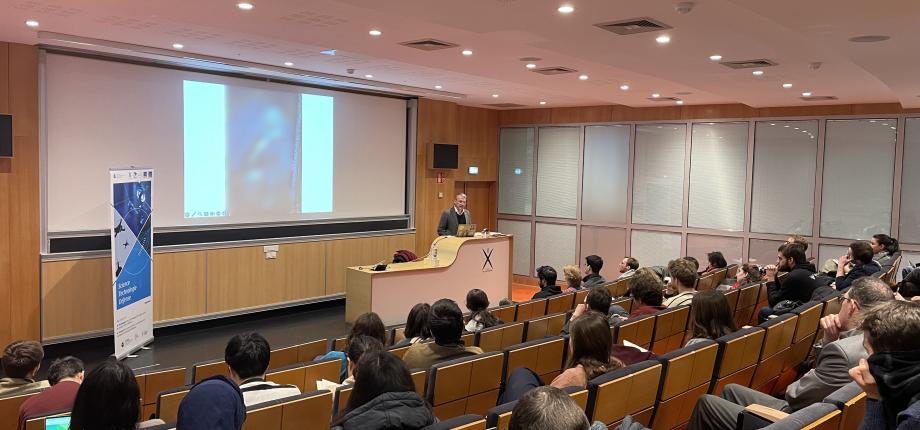Global politics and history in the 20th and 21st centuries: an education that builds bridges between the sciences

At the crossroads of fundamental and social sciences
This training aims to build more bridges between the fundamental sciences and the social sciences, as well as between these sciences and the CIEDS. The series of courses offered is halfway between an introduction to disciplines such as history and political science and an in-depth study of methods and sources. This approach benefits both the speakers and the participants.
This training programme provides researchers with the necessary teaching time to establish the foundations of their discipline. They can then develop a particular issue based on their research work.
‘This course demonstrates that the humanities also have rigorous approaches that can support scholarly discourse.’
This initiative also benefits participants from a range of backgrounds, including master's and doctoral students, postdoctoral researchers and Ministry of Defence and Ministry of the Interior staff. Manuel Dorion-Soulié hopes that, through this training, participants will understand different approaches to reality and be able to explore issues related to international relations when encountering current events in the media.
‘I want to shed light on contemporary issues by taking as much historical and conceptual distance as possible, but also to show that there are rigorous approaches to international relations issues that deserve to be known.’
The training menu
This course will cover the history of the world's major powers, namely the United States, Russia and China since the beginning of the 20th century, as well as the major issues raised by international relations (international law, terrorism, military alliances, climate change). It will take place over three Fridays from 9 a.m. to 5 p.m.: 9 January, 16 January and 23 January. The courses will be taught in French, but the materials will be in English.
Friday, 9 January
- Introduction to US Hard and Soft Power since 1929
Speaker: Manuel Dorion-Soulié – Assistant Professor of American Studies (École Polytechnique) - The Architecture of International Law and the Laws of War
Speaker: Amélie Ferey – Political Science (French Institute of International Relations)
Friday, 16 January
- NATO, from 1949 to the war on terror
Speaker: Jenny Raflik Grenouilleau - Professor of Contemporary History (University of Nantes) - China and the international economy since 1949
Speaker: Camille Brugier - Political Science (Strategic Research Institute of the École Militaire)
Friday, 23 January - Preliminary programme
- Russia and the USSR since 1917
Speaker: Cédric Pernette - Senior Lecturer in Russian Language and Civilisation (Sorbonne University and École Polytechnique) - European Defence Economy Since 1945
Speaker: Julien Malizard - Doctor of Economics and holder of the Defence Economics Chair (IHEDN)
Practical information
Who is it for? Students, doctoral students, postdoctoral researchers and staff at IP Paris and its schools; staff at the French Ministry of Defence and Ministry of the Interior.
Where? École Polytechnique, Route de Saclay, 91120 Palaiseau. Lecture theatre locations will be provided after registration.
Registration: free but mandatory, before 19 December 2025. Registrations must be made by email and should state your surname, first name, employer, position and work email address.
Partial participation remains possible, although it is not recommended. Please specify this when registering, if applicable.
Testimonial from the 2025 edition
Marie Cherasse, postdoctoral researcher in 2025 at the Applied Optics Laboratory (LOA) at École Polytechnique:
‘Historians and economists have different approaches to presentation and dialogue. I was curious to learn more about these different approaches. My work has applications in the civilian sphere and could also have applications in the military sphere. This training has given me additional motivation to work for France's sovereignty.’
Rafaël Valente, master's student in Data and Finance at École Polytechnique and HEC Paris:
‘In the world of politics, law and social sciences, you start at point A and end up at point B. The structure for forming a thesis is quite similar to that of my courses. You need to have arguments and facts to support your thesis. This training helps me to better understand current political situations and conflicts, such as the war in Ukraine or the conflicts in the Middle East.’













